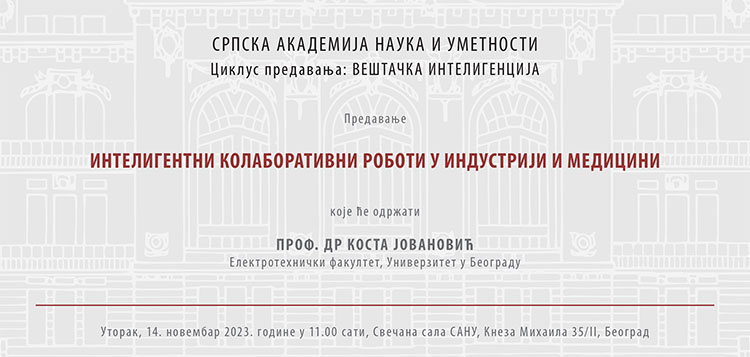Lecture ’Intelligent Collaborative Robots in Industry and Medicine’
As part of the lecture series ’Artificial Intelligence’, Professor Kosta Jovanović is to give a lecture titled ’Intelligent Collaborative Robots in Industry and Medicine,’ at the SASA Grand Hall, on Tuesday, 14 November, at 11 a.m.
Robots in industrial settings have reached special technical performances related to repetitive acts (precision), work speed and load they can cover. Current research in robotics has been directed to the improvement of work safety, facilitation of use and programming and more efficient absorption of new technologies, which open new domains for robot applications. Collaborative robots (cobots) are the latest robotic technology designed for a more efficient and safer interaction with people and work in a shared environment. The number of installed cobots and market size expand dramatically every year. However, in order to additionally boost collaborative robot acceptance and provide uninterrupted physical interaction, it is necessary to teach them to understand the surroundings and human behaviour models, quantify interaction parameters and carry out movements in such a manner that, according to the specific task requirements, they compromise between safety and task achievement efficiency. Within the lecture, current developments in the field of collaborative robotics will be shortly presented, with a special focus on the ongoing research in robotics at the ETF Robotic Laboratory, Signals & Systems Department, School of Electrical Engineering (ETF) of the University of Belgrade. This lecture aims to encourage discussion on perspectives of further development of robotics on a national and global scale.
Professor Kosta Jovanović is an associate professor and head of the ETF Robotic Laboratory, Signals & Systems Department, the School of Electrical Engineering (ETF) of the University of Belgrade. He received his BSc in 2009 from the School of Electrical Engineering as the top graduate of the Electrical Engineering and Computer Science study programme. In 2016, he earned his doctorate from ETF in the field of robotics, under the supervision of Professor Veljko Potkonjak, while he was professionally trained in SMS Siemag Company in 2009, at the Technical University of Munich in 2010, and at DLR Institute for Robotics and Mechatronics – German Centre for Space Research in 2013, all in Germany.
He was a scholarship student and the coordinator of the Alumni Club – Zoran Djindjic Internship Programme of German Business, as well as of the Board for Economic Ties between Germany and Eastern Europe, and an intern of the German Academic Exchange Service (DAAD). His scientific contributions are evident in the design and management of new-generation robot production through the development of methods for safer and more efficient physical cooperation of robots with their surroundings and collaborative robot application in industry and health care. He has published more than 20 papers in renowned international journals, and the research he participated in for the last two years was published in the most prestigious robotic journals: IEEE Robotics Automation Magazine, IEEE Robotics and Automation Letters, and Journal of Robotics Research. His papers have been cited more than 1650 times. He was at the helm of numerous projects in the robotics field at the School of Electrical Engineering such as Horizon 2020 and Horizon Europe (MUSAE, DIH-HERO, DIH2 as well as SHOP4CF and ReconCell projects) and the Science Fund of the Republic of Serbia’s projects such as ForNextCobo, PROMIS Programme and CirucuBot Programme of the Green Programme of Cooperation between Science and Industry. He has received multiple awards for best papers (28th RAAD conf. 2019, Kaiserslautern, Germany, and domestic ETRAN conference on several occasions), as well as AmCham Leader in Change HERO Award (The American Chamber of Commerce in Serbia); 1st Place NMMI Winter School on Robotics: Variable Stiffness Actuators (Rome, Italy, 2015); Award of the City of Belgrade (2013), Exit Foundation Award (2016); Nikola Tesla Foundation Junior Achievement Award (2012); The Award of the University of Belgrade (2011).
A live stream is available at LIVE STREAMING
The footage of previously held lectures within the Artificial Intelligence lecture series is available at Снимци предавања из циклуса „Вештачка интелигенција”.

